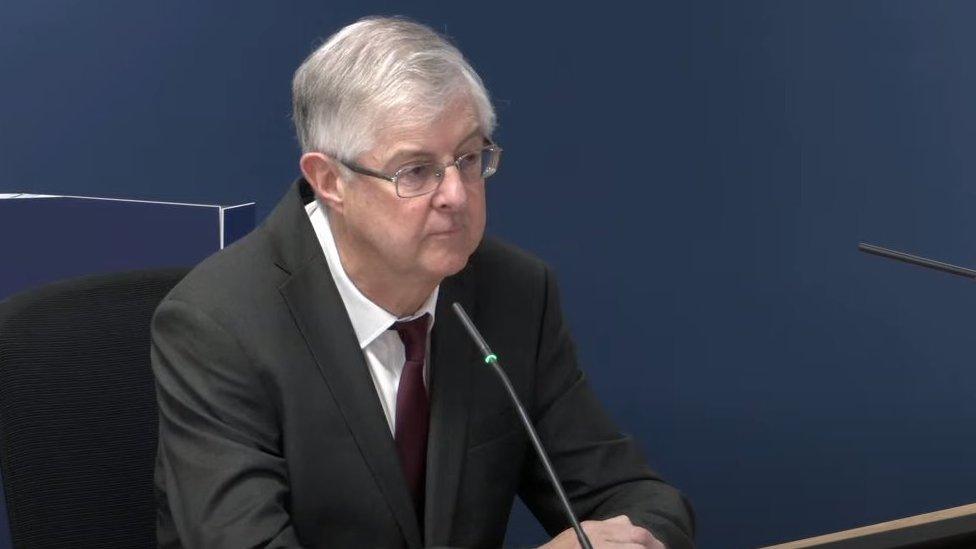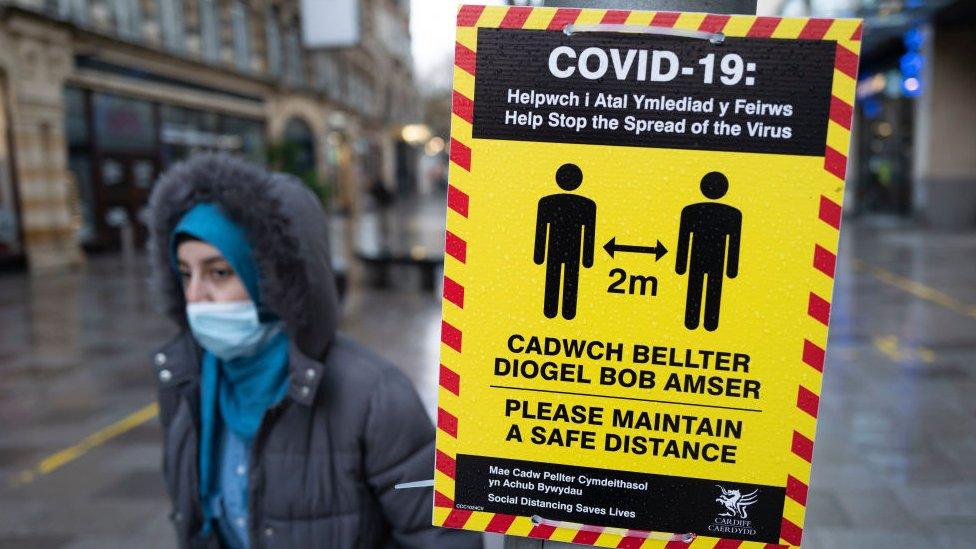Welsh pandemic plans caused bereaved families pain - minister
- Published
Mr Gething was giving evidence to the UK Covid-19 Inquiry
Two of Wales' most senior Labour ministers, including Mark Drakeford, have admitted failings over the country's planning for a pandemic.
The former health minister, Vaughan Gething, said Wales was not prepared enough to deal with excess deaths.
Plans that did exist for pandemic flu would have also left Wales vulnerable, Mr Gething told the Covid inquiry.
Meanwhile the first minister said the Welsh government was not as prepared as it could have been.
But Mark Drakeford defended the fact resources were diverted from pandemic plans to readying for a possible no-deal Brexit.
The chief medical officer, Sir Frank Atherton, said on Monday that plans for the possibility of leaving the EU without a deal held up work to prepare for a flu outbreak.
Mr Gething said that if he had spent more time looking at pandemic plans he could have sped up preparedness.
Conservatives and Plaid Cymru called for a Wales-specific inquiry into the pandemic, after the hearing.
Mr Gething is currently economy minister but served as health minister from 2016 to 2021.
Questioned by a barrister for the Welsh Covid bereaved families group, the minister said: "One of the things I found most difficult was the dignity in death and knowing what a bad death is, and understanding that has a real impact on people left behind."
He said work to increase capacity at mortuaries and crematoria "was not fully completed".
"That meant that when Covid came we were not as prepared as we could and should have been, and that does… lead to additional pain for bereaved families," he said, adding he accepted responsibility.
'We went through PPE fast'
It was put to Mr Gething, by inquiry counsel Kate Blackwell, that Wales' PPE stockpile had been "woefully inadequate" to deal with the pandemic being planned for.
"We would go through PPE at a much faster rate than our planning assumptions assumed we would, so actually, we found that our stockpile that should have lasted for a whole wave didn't," he said.
He then added: "I think it's fair to say that the plan for an influenza pandemic would still have had challenges.
"I hesitate to say it was inadequate because it's such a loaded term but, certainly, with all the evidence that I've seen… the planning for an influenza pandemic was not complete, and we would have had vulnerabilities if it had been an influenza pandemic."
Under examination, the health minister said he did not question the assumption in plans for a pandemic that flu was the biggest risk.
Mr Gething made the comment after he confirmed that he had not read documents, guidance and plans looking at civil emergencies and pandemic flu, until he prepared for the inquiry.
"I did not read those on my entry into the post," Mr Gething said, saying some of them were not for ministers to read through.
"If I read all of those documents and others within my brief, then I wouldn't get to do anything else."
He did say that he received briefings on the Welsh government's preparedness for a pandemic, and later added: "I didn't question the assumption that an influenza pandemic was the most likely of the pandemic risks."
Minister could have spent more time planning
The minister also admitted that he had not read the report that resulted from the Cygnus exercise into preparing for pandemic flu.
The counsel to the inquiry, Kate Blackwell, read out a part of the conclusions that found the UK's plans, policies and capabilities were not sufficient to cope with the severe demands of an extreme pandemics.
He said if he had read it he would "have asked extra questions about what was taking place".
Advisers had fed back that there was a need for improvements, and he said he had received briefings.
But he added: "Looking back, I think it is fair to say that if I had put more ministerial time into this, then I may well have sped-up preparedness."

Mark Drakeford suggested the counsel to the inquiry was being "unduly bleak" about how Wales prepared for a pandemic
In his evidence, Mark Drakeford also admitted failings but defended the work the Welsh government did do.
The lead counsel to the inquiry, Hugo Keith, said that "in the round there were and there continued to be significant failings" on government preparedness for a pandemic.
He cited a lack of resilience in planning, a lack of resources and a lack of updating policies.
Mr Drakeford conceded that the Welsh government was not as prepared as it could be, and that there were failings, but said the counsel was being "unduly bleak" .
"While some things had failed to be followed through, it was a failure in part rather than in whole," he said.
Mr Keith pressed him, asking if Mr Drakeford agreed "in terms of the consideration of whether or not structurally the system of preparedness in advance of the pandemic was simply not as good as it should have been".
The first minister responded: "Put like that, I would agree. Yes."
'Dangers in front of us'
He told the inquiry resources across the Welsh government had to be diverted from preparing for a pandemic "into dealing with the dangers that are sitting right in front of us, of leaving the European Union without a deal".
"We faced a real risk that we left the European Union without a deal, that water supply would no longer be usable. That is the sort of present danger that you are talking about," he said.
He told the inquiry that when he became first minister in 2018 he did not receive advice from civil servants that he needed to be aware of difficulties with pandemic planning.
Separately, he said the Welsh government also did not feel a need to create a Wales-specific risk assessment document to set out the risks facing the Welsh government.
Asked about the principle that all risk is local, Mr Drakeford said that, at the time, "I'm not sure we would have felt there was a huge advantage to be gained from deducing Welsh specific risks when the UK government process looked like one that had the expertise to deliver it".
He went on to say that "for certain purposes it is sensible from a Welsh perspective to rely on the expertise and capacity that the UK government has and we were content at this point to do so" and that creating a Welsh intermediate tier for a national risk register "did not justify the resources".
But he added that there was a "community risk register" in the four local resilience forums, for things such as local-specific potential vulnerabilities such as explosions in oil refineries.
Calls for Welsh inquiry
Following the hearing Welsh Conservative health spokesperson Russell George told BBC Radio Wales Drive that other parts of the UK "seemed to be more prepared" for a pandemic.
He said: "We're really keen as Welsh Conservatives that there should be a Wales-wide specific public inquiry.
"It just shows from some of the evidence that's provided today that Wales did do things very differently. And that's something the first minister pointed out at several occasions throughout the pandemic."
Plaid Cymru health spokesperson Mabon ap Gwynfor said it was "revelatory" that "there was a serious lack of preparation by the Welsh government".
He said: "They were assuming that things were in place, that things were done. Clearly, they weren't.
"That's why we need an inquiry in Wales, so that we can not only identify the weaknesses that we've had in Wales, and clearly there were a number of weaknesses which have been highlighted."
Anna-Louise Marsh-Rees, of the Covid-19 Bereaved Families Group Cymru, criticised the health minister.
"We have to ask what the role of a health minister is. He hadn't read anything, he hadn't asked anything, he wasn't inquisitive, he wasn't interested. The arrogance was unbelievable. No wonder it all went wrong."
Related topics
- Published3 July 2023

- Published13 June 2023

- Published13 June 2023